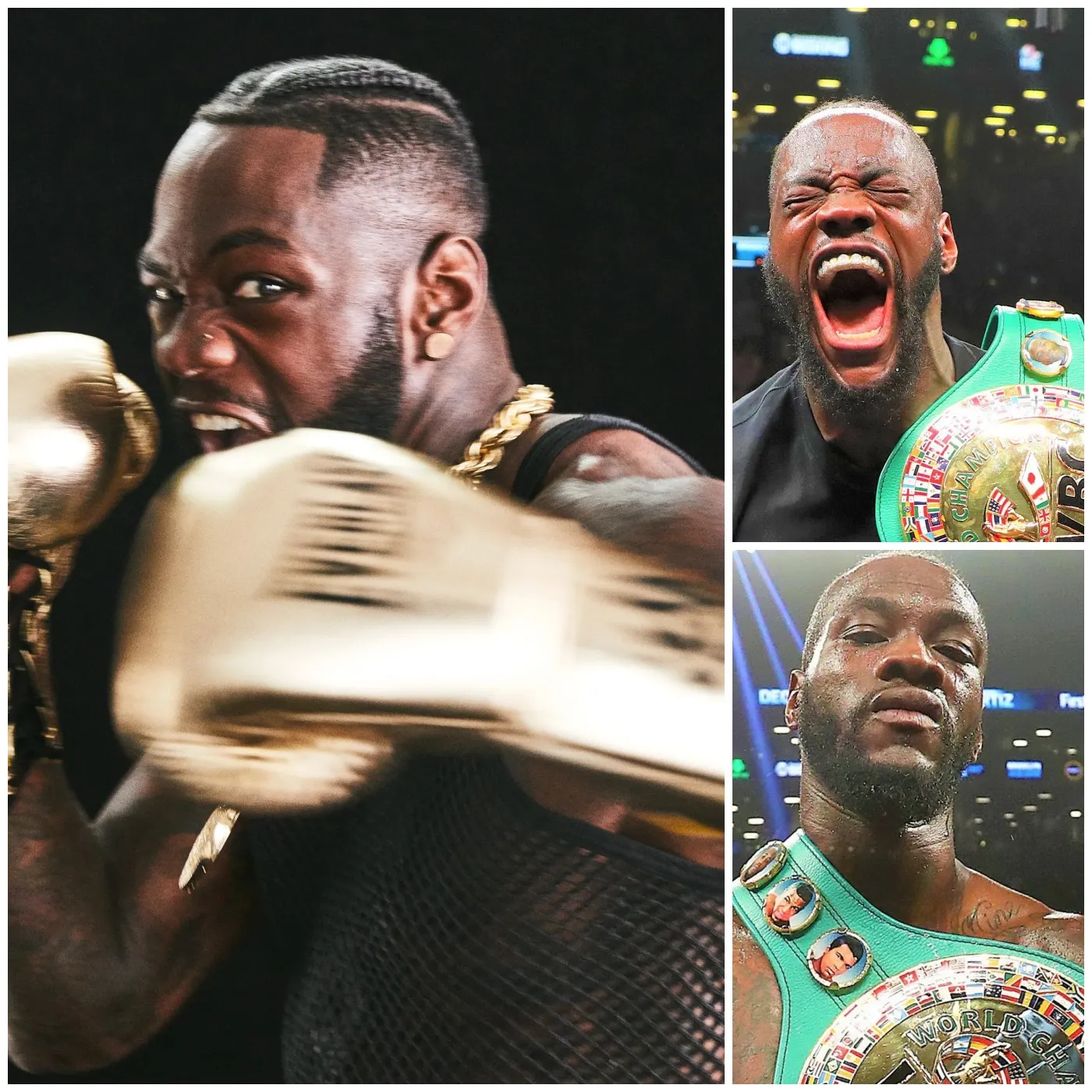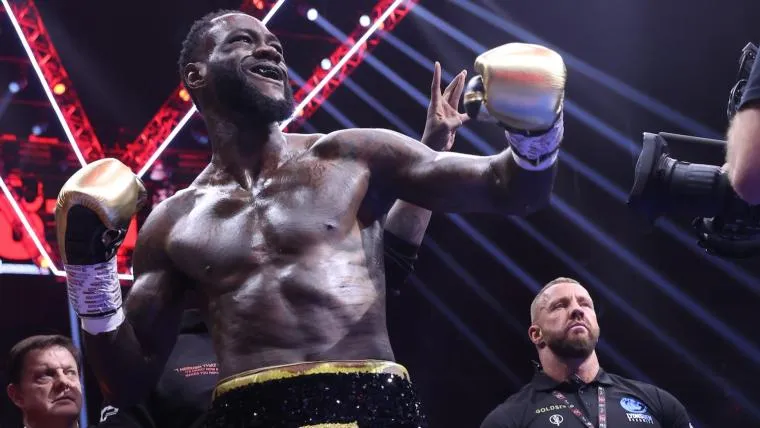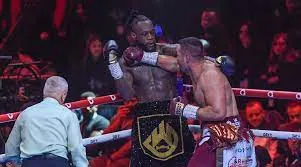Why Has Deontay Wilder Failed to Evolve as a Fighter?

Deontay Wilder, once the reigning WBC Heavyweight Champion, became one of the most feared boxers in the division due to his devastating knockout power. With a knockout-to-win ratio that is one of the highest in heavyweight boxing history, Wilder’s right hand has earned him the moniker of the “Bronze Bomber.” However, despite his raw power and early success, many fans and analysts argue that Wilder has failed to evolve as a fighter.
The question that keeps resurfacing in boxing circles is: Why has Deontay Wilder failed to evolve as a fighter? Is Wilder simply stuck in his ways, relying on his overwhelming power, or is there something more profound at play in his reluctance to expand his skill set?

In this article, we will examine why Wilder’s technical growth has plateaued and how this has affected his performance against elite competition like Tyson Fury. We will also explore the potential reasons for his resistance to change and whether it’s too late for him to adapt.
Wilder’s Early Success: The Power That Defined Him
Deontay Wilder’s rise to prominence in boxing was meteoric. From his first professional fight in 2008, it quickly became clear that Wilder’s most dangerous weapon was his knockout power. With a remarkable 91% knockout-to-win ratio, Wilder became known for his ability to end a fight with a single punch. This overwhelming power in his right hand earned him the WBC Heavyweight Championship and a reputation as one of the most dangerous men in the sport.
However, as his career progressed, especially with his fights against Tyson Fury, Luis Ortiz, and other top competitors, it became apparent that his boxing style was largely one-dimensional. While his power remained his greatest asset, Wilder’s reliance on this singular skill came under scrutiny as he faced increasingly technical opponents who were able to avoid or weather his heavy blows.
Lack of Technical Evolution: Stuck in His Ways
One of the most common critiques of Wilder’s career has been his failure to develop a well-rounded skill set. While his knockout power has carried him through many fights, it hasn’t been enough to overcome fighters who possess a more comprehensive boxing technique.
-
Footwork and Defense: One of the most glaring issues with Wilder’s fighting style is his lack of defensive skills. He has often been criticized for having poor head movement and not maintaining an effective guard. In his trilogy with Tyson Fury, it became evident that Wilder struggled to avoid punches, particularly against a master technician like Fury. His defensive flaws left him open for counters, allowing Fury to land clean shots throughout their fights.
-
Offensive Variety: While Wilder’s right hand is undoubtedly powerful, his offensive game lacks variety. He has repeatedly relied on one punch to end a fight, which works against less skilled opponents but becomes a liability when facing fighters who can take a punch and avoid being hit cleanly. In his first fight against Fury, Wilder was unable to land his signature right hand with any consistency, which led to a draw. In their second encounter, Fury completely outboxed him, leaving Wilder unable to adjust.
-
No Plan B: Wilder’s biggest downfall against Fury was his inability to adapt when his knockout power didn’t work. His reliance on the one-punch knockout became predictable, and he had no alternative strategy when Fury neutralized that weapon. Top fighters like Fury, Oleksandr Usyk, and Anthony Joshua have demonstrated an ability to adjust and adapt mid-fight, something Wilder has yet to prove he can do.
Resistance to Change: A Fighter Set in His Ways?
Many boxing experts and fans believe that Wilder’s refusal to evolve stems from an emotional attachment to his knockout power. He has built his entire career on the idea that his right hand is enough to win him any fight. This mindset has led to his resistance to improving his technical skills, as he may feel that he doesn’t need to.
-
Emotional Attachment to Power: Wilder’s confidence in his knockout power has often led him to believe that it’s all he needs to win. His self-belief in his devastating right hand has overshadowed the necessity to improve his footwork, defense, and combination punching. Rather than refine his weaknesses, Wilder has opted to keep relying on the one thing that has served him well in the past: his power. This reliance, however, is dangerous against top-level competition.
-
Fear of Failure and Stagnation: Another reason Wilder may be hesitant to evolve as a fighter is a fear of failure. Changing his approach could be seen as admitting that his power isn’t enough to carry him through every fight. This mindset could make him uncomfortable with trying new techniques, and he may resist adding complexity to his game in fear of making mistakes that could cost him his reputation.
-
Pride and Stubbornness: Wilder is also a fiercely proud fighter who has built his career on his identity as a knockout artist. He has often rejected criticism and claims that he doesn’t need to change his style. In interviews, Wilder has stated that he would continue to rely on his power and not “get fancy” in the ring. This sense of pride and stubbornness has, unfortunately, led him to remain one-dimensional and unadaptable when facing superior opponents.

Wilder’s Failures Against Fury: The Proof is in the Ring
The trilogy between Wilder and Fury provides a clear example of how Wilder’s failure to evolve has hurt him.
-
First Fight (2018): In their first encounter, Wilder was unable to land his powerful right hand consistently, and his lack of technical boxing skills was apparent. Fury dominated most of the rounds with his superior movement and slick boxing, but Wilder’s power kept him in the fight, leading to a split draw. However, it was clear that Fury had more in his arsenal, and Wilder was exposed for lacking adaptability.
-
Second Fight (2020): In the rematch, Fury came in with a new strategy, using his size and strength to smother Wilder and land punishing blows. Wilder couldn’t adjust his tactics, and Fury stopped him in the seventh round. This fight highlighted Wilder’s inability to cope when faced with a fighter who could take his power and continue to press forward.
-
Third Fight (2021): The third fight was a dramatic affair, with Wilder showing heart by getting up from two knockdowns. However, Fury’s overwhelming combination of skill and power proved too much, and Wilder was stopped again in the 11th round. Despite his resilience, Wilder’s inability to defend himself and his reliance on power once again led to his downfall.
Can Wilder Evolve Before It’s Too Late?
While Wilder’s knockout power remains one of the most dangerous tools in boxing, it’s clear that to compete with the best in the heavyweight division, he needs to develop a more complete boxing style. This could include improving his footwork, defense, and ring IQ, as well as learning to vary his attack beyond just looking for the knockout.
However, at 38 years old and with his boxing career already defined by his power, the question is: Is it too late for Wilder to evolve?
It’s possible that Wilder can improve, especially with the right coaching and mindset. But whether he is willing to make the necessary adjustments and challenge his self-limiting beliefs is another story. The longer he refuses to evolve, the more predictable and vulnerable he will become against the elite fighters in the division.
Deontay Wilder’s career has been defined by his knockout power, but it is increasingly clear that his failure to evolve as a fighter has made him predictable and vulnerable. His refusal to adapt his boxing style, combined with an emotional attachment to his power, has limited his potential as a fighter. If Wilder truly wants to return to the top of the heavyweight division, he will need to break free from his one-dimensional approach and start evolving technically before it’s too late.





